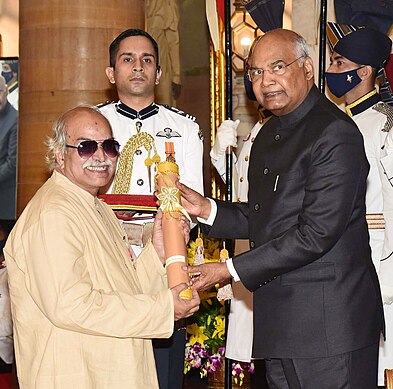Harish Chandra Verma | |
|---|---|
 Verma during a lecture in 2019 | |
| Born | 3 April 1952 |
| Alma mater | |
| Known for | Concepts of Physics textbook |
| Awards |
|
| Scientific career | |
| Fields | Nuclear physics |
| Thesis | Studies Of The Electric Field Gradients in Non-cubic Metals Using 57^Fe Mössbauer Spectroscopy (1980) |
| Doctoral advisor | Prof. G. N. Rao (IIT Kharagpur) |
| Website | hcverma |
Harish Chandra Verma (born 3 April 1952), popularly known as HCV, is an Indian experimental physicist, author and emeritus professor of the Indian Institute of Technology Kanpur. In 2021, he was awarded the Padma Shri, the fourth highest civilian award, by the Government of India for his contribution to Physics Education.[1] His field of research is nuclear physics.[2]
He has authored several school, undergraduate and graduate level textbooks, including but not limited to the most popular and most notably the two-volume Concepts of Physics, extensively used by students appearing for various high-level competitive examinations.[3][4]
He has co-founded Shiksha Sopan, a social upliftment organization for economically weaker children living near the campus of IIT Kanpur.[3][5] He has dedicated himself in training young minds in the field of Physics. He has immensely contributed to popularising Physics education among Indian students and teachers by conducting lectures and experimental demonstrations.
He has been awarded the Maulana Abul Kalam Azad Shiksha Puruskar by the Bihar state government.[3][6]
Early life and study
[edit]Verma was born on 3rd April, 1952 to Ganesh Prasad Verma, a teacher and Ramvati Verma in Darbhanga, Bihar. He obtained his B.Sc. degree at the Patna Science College. Then he obtained M.Sc. and Ph.D. at the IIT Kanpur.[3][4]
Career
[edit]Patna Science College
[edit]In early 1980, Verma joined Patna Science College as a lecturer.[3] He remained at the college as a lecturer and reader for 15 years[6] before resigning from the college and joining IIT Kanpur.
IIT Kanpur
[edit]Verma joined IIT Kanpur in 1994 as an assistant professor. Here he pursued research in experimental nuclear physics. He has published 139 research papers.[7] He retired on 30 June 2017.[8]
Physics outreach
[edit]
Verma has developed more than six hundred ‘low cost’ physics experiments that teachers can employ in their classrooms. In 2011, he set up the National Anveshika Network of India (NANI), a flagship program of the Indian Association of Physics Teachers (IAPT). He is the national coordinator for this program. There are currently 22 Anveshikas in the country.[3][4]
Bibliography
[edit]- Concepts of Physics Part-1, Bharati Bhawan Publishers & Distributors, 1992, ISBN 8177091875
- Concepts of Physics Part-2, Bharati Bhawan Publishers & Distributors, 1992, ISBN 8177092324
- Quantum Physics, Surya Publication, ISBN 9788192571409
- Foundation Science Physics for class 9, Bharati Bhawan Publishers & Distributors, ISBN 9788177097313
- Foundation Science Physics for class 10, Bharati Bhawan Publishers & Distributors, ISBN 9350270064
- Bhautiki Ki Samajh Part-1, Bharati Bhawan Publishers & Distributors, ISBN 9350271990
- Classical Electromagnetism, Bharati Bhawan Publishers & Distributors, ISBN 978-9388704823
Online courses
[edit]- Nuclear Physics: Fundamentals and Applications (organized by National Program for Technology Enhanced Learning, NPTEL)
- Learning Physics through Simple Experiments (Massive Online Open Course in 2016)
- Physics of Semiconductors (Massive Online Open Course in 2017)
- B.Sc. courses in Hindi - Basics of Special Theory of Relativity (2018)
- Basics of Quantum Mechanics (2019)
- Advanced Course on the Special Theory of Relativity (2020)
- Classical Electromagnetism - Electrostatics (2020)
- Classical Mechanics (2021)
- The Story of Photoelectric Effect (2021)
Awards
[edit]- Padma Shri (2021)[1]
- Maulana Abul Kalam Azad Shiksha Purashkar (2017)[9]
References
[edit]- ^ a b "Padma Awards | Interactive Dashboard". www.dashboard-padmaawards.gov.in. Archived from the original on 1 February 2022. Retrieved 26 January 2020.
- ^ "Profile of DR. H. C. Verma". Indian Institute of Technology Kanpur. Retrieved 2 April 2016.
- ^ a b c d e f "Meet Padma Shri HC Verma, who struggled to pass in school, teaches India Physics today". Hindustan Times. 10 February 2020.
- ^ a b c "Meet the man who taught India physics". Deccan Chronicle. 6 June 2018.
- ^ "Spreading the light of knowledge". The Tribune. 31 August 2014. Retrieved 19 September 2014.
- ^ a b "Azad honour for physics teacher". The Telegraph. 11 November 2017.
- ^ Verma, H C. "Prof. H C Verma". H C Verma. Retrieved 10 April 2018.
- ^ "IIT Kanpur's HC Verma retires, students pour adoration on Twitter". The Indian Express. 3 July 2017.
- ^ "प्रो. एचसी वर्मा को मौलाना आजाद शिक्षा पुरस्कार". Hindustan (in Hindi). Retrieved 28 August 2020.